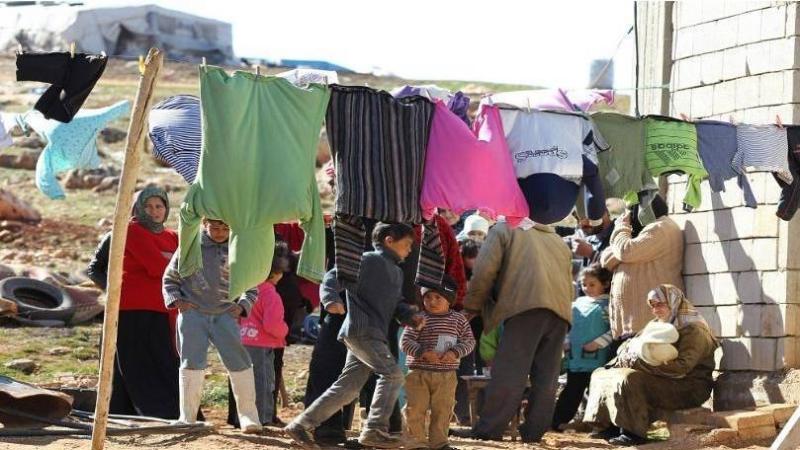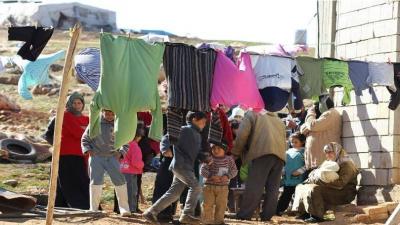There will be no return for Syrian displaced persons to their homeland today, tomorrow, or at best, the day after. The official Lebanese position, expressed at the sixth Brussels conference on "Supporting the Future of Syria and the Region," remains unyielding unless the Syrian regime decides to repatriate its citizens first. As it stands, this seems nearly impossible. The pressure Lebanon exerted prior to the "conference" to return the displaced, stemming from its collapse and inability to bear the costs, crumbled just hours after its conclusion. The UN's response came in two forms: the first direct, where the Lebanese side didn't sense any intention from the regime to return the displaced, but rather a necessity to integrate them into the societies they are in, granting them legal residency and providing jobs. The second indirect, through the "report of the Special Rapporteur on extreme poverty and human rights, Olivier De Schutter," which refers to the Syrians present as "refugees" and not displaced persons, highlighting that they are scapegoats facing discrimination and are denied work in most professions due to the official non-integration policy of the government. The report recommended "ensuring the right to work for refugees by legally opening all professions to them."
The regime does not want them. While the "Assad regime" claims to welcome the return of the displaced, it has not actually provided any security, political, living, or legal guarantees for their safe return," according to former Minister of Social Affairs Dr. Richard Kiyomjian. "Those who today advocate for the need to return the displaced are, in reality, those who opposed the plan we prepared for their return in the Ministry of Social Affairs years ago." According to Kiyomjian, "The Syrian regime and its ally, Hezbollah, do not want this return; otherwise, they would facilitate the return of regime loyalists who participated in the recent presidential elections to the regions of Qusair, western Zabdani, and other areas controlled by the party." In his view, the crux of the matter is not the position of international organizations calling for safe return but rather the lack of serious guarantees from the Syrian regime to protect this return, whether in terms of living conditions or exemptions from compulsory military service, or the restoration of confiscated homes and properties. They blame the international community and its organizations, while Lebanon should have a clear plan for their return.
The position of donor countries and global organizations contradicts all interpretations. The "international community, or what is meant by the major donor countries," considers that the return of Syrian refugees in neighboring host countries (such as Turkey, Jordan, Iraq, Egypt, and Lebanon) is governed by achieving a political solution in Syria and implementing UN Resolution 2254 to ensure sustainable return, according to the general supervisor of the "Lebanon Crisis Response Plan," Dr. Ola Batroun. "Given that the current circumstances in Syria are unsuitable for return. Negotiations have become more complicated, especially after Russia shifted from a partner in international decision-making regarding Syria to a country immersed in international sanctions." Regarding the "United Nations," it works, as Batroun states, under "international standards" that stipulate respect for the principle of non-refoulement and ensuring safety. The UN is unable to take any steps to encourage comprehensive return before securing substantial financial support that guarantees the displaced can return to their normal lives in their original areas and initiate reconstruction that is expected to be funded by assistance from donor countries.
The aid is insufficient. There is no doubt that the perspective of the international community and global refugee standards differs from the Lebanese view on the matter. The United States and European countries signed the "1951 Refugee Convention" and the 1967 Protocol, which stipulate that a refugee should be granted residency and work permits and ensure the right to adequate housing. This contributes, in turn, to the development of the host country's economy and facilitates the integration of refugees into society. Regardless of the status of Syrians in Lebanon, whether they are displaced and able to return or refugees, the paradox, according to Batroun, is that "international standards do not apply to Lebanon, and implementing these conditions faces numerous legal, technical, and political obstacles, the most important being:
- Lebanon is one of the countries that did not sign the 1951 Convention, thus it is not obliged to implement its provisions.
- Displacement was not a Lebanese choice but was imposed due to the open-border policy adopted at the beginning of the Syrian war in 2011.
- The number of Syrian displaced persons is very large, nearing one and a half million.
- Lebanon is engulfed in an economic crisis unprecedented globally for 150 years, according to the World Bank's description.
- High poverty rates, with an estimated 80 percent of the population living under multidimensional poverty.
- A significant increase in unemployment rates (the unemployment rate has tripled according to a recent survey carried out by the Lebanese government and the UN, reaching 29.6 percent last January).
All these factors render Lebanon, in deed and not merely in word, incapable of responding to the international community's requirements to continue hosting "refugees" and meeting their needs. Conversely, the aid Lebanon has received, estimated at $9 billion, remains "far less than what Lebanon has directly and indirectly expended to serve about 1.7 million refugees, including 1.5 million Syrians, 180,000 Palestinians, 29,000 Palestinian Syrians, and 20,000 Iraqis," according to Batroun. The assistance promised to Lebanon has not come fully; of the $2.6 billion agreed upon last year, only $1.6 billion has arrived. The state is now requesting $3 billion for essential developmental needs. From Batroun’s perspective, "what is needed today is not just financial assistance but support for development projects. This is what is being worked on with donor and assisting parties to ensure that this aid has a greater impact on society."
While tens of thousands of Lebanese are migrating legally and illegally from their homeland, the return of Syrians, both displaced and refugees, seems postponed. As long as the Assad regime remains in power, this issue will continue to be subject to rejection at times and manipulation at others, and Lebanon will continue to bear the greatest cost to its society and economy.
Khaled Abu Shaqra - Nidaa Al-Watan




